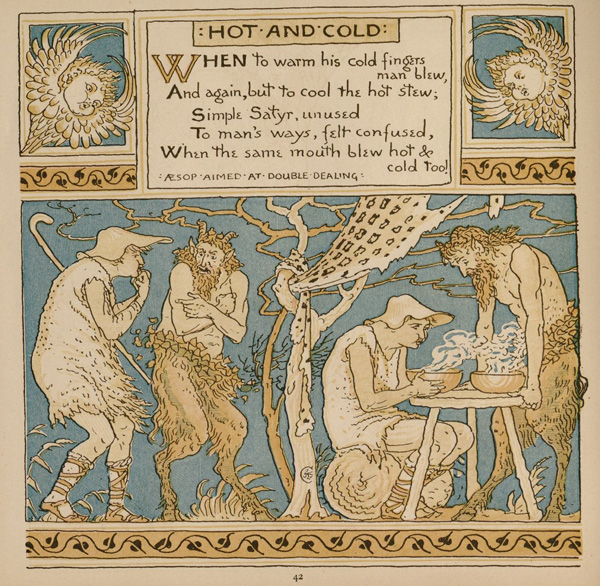One of the creatures that you will meet here is a satyr, a half-goat, half-human creature from Greek mythology. Satyrs lived in the woods and wilderness and were especially associated with the gods Pan and Dionysus. You can read more about satyrs at Wikipedia.
You will also read a fable Hercules, a demigod who was the son of Jupiter (Zeus) and a mortal woman, Alcmene. Hercules was an object of the devotion in the ancient world, someone you would pray to in an hour of need — even if what you really needed to do was just to solve the problem yourself, as this fable shows.
[Notes by LKG]
These fables are part of the Aesop's Fables (Jacobs) unit. Story sources: The prose fables are from The Fables of Aesop by Joseph Jacobs (1894) and the limericks and illustrations are from The Baby's Own Aesop by W. J. Linton and illustrated by Walter Crane (1887).
Humans and Gods
Jacobs 41. The Man and the Wooden God (Perry 285)
In the old days men used to worship stocks and stones and idols, and prayed to them to give them luck. It happened that a Man had often prayed to a wooden idol he had received from his father, but his luck never seemed to change. He prayed and he prayed, but still he remained as unlucky as ever.
One day in the greatest rage he went to the Wooden God, and with one blow swept it down from its pedestal.
The idol broke in two, and what did he see? An immense number of coins flying all over the place.
~ ~ ~
Two neighbours came before Jupiter and prayed him to grant their hearts' desire. Now the one was full of avarice, and the other eaten up with envy. So to punish them both, Jupiter granted that each might have whatever he wished for himself, but only on condition that his neighbour had twice as much.
The Avaricious man prayed to have a room full of gold. No sooner said than done; but all his joy was turned to grief when he found that his neighbour had two rooms full of the precious metal.
Then came the turn of the Envious man, who could not bear to think that his neighbour had any joy at all. So he prayed that he might have one of his own eyes put out, by which means his companion would become totally blind.
Vices are their own punishment.
~ ~ ~
A Man had lost his way in a wood one bitter winter's night. As he was roaming about, a Satyr came up to him, and finding that he had lost his way, promised to give him a lodging for the night, and guide him out of the forest in the morning.
As he went along to the Satyr's cell, the Man raised both his hands to his mouth and kept on blowing at them.
"What do you do that for?" said the Satyr.
"My hands are numb with the cold," said the Man, "and my breath warms them."
After this they arrived at the Satyr's home, and soon the Satyr put a smoking dish of porridge before him. But when the Man raised his spoon to his mouth he began blowing upon it.
"And what do you do that for?" said the Satyr.
"The porridge is too hot, and my breath will cool it."
"Out you go," said the Satyr. "I will have nought to do with a man who can blow hot and cold with the same breath."
Crane 44. Hot and Cold (Perry 35)
When to warm his cold fingers, man blew,
And again, but to cool the hot stew;
Simple Satyr, unused
To man's ways, felt confused,
When the same mouth blew hot and cold too.
AESOP AIMED AT DOUBLE-DEALING

~ ~ ~
A Wagoner was once driving a heavy load along a very muddy way. At last he came to a part of the road where the wheels sank half-way into the mire, and the more the horses pulled, the deeper sank the wheels.
So the Waggoner threw down his whip, and knelt down and prayed to Hercules the Strong. "O Hercules, help me in this my hour of distress," quoth he.
But Hercules appeared to him, and said: "Tut, man, don't sprawl there. Get up and put your shoulder to the wheel."
The gods help them that help themselves.
Crane 9. Hercules and The Wagoner (Perry 291)
When the God saw the Wagoner kneel,
Crying, "Hercules! Lift me my wheel
From the mud, where 'tis stuck!"
He laughed - "No such luck;
Set your shoulder yourself to the wheel."
THE GODS HELP THOSE WHO HELP THEMSELVES

~ ~ ~
An old labourer, bent double with age and toil, was gathering sticks in a forest. At last he grew so tired and hopeless that he threw down the bundle of sticks, and cried out: "I cannot bear this life any longer. Ah, I wish Death would only come and take me!"
As he spoke, Death, a grisly skeleton, appeared and said to him: "What wouldst thou, Mortal? I heard thee call me."
"Please, sir," replied the woodcutter, "would you kindly help me to lift this faggot of sticks on to my shoulder?"
We would often be sorry if our wishes were gratified.
Next page: Family and Friends